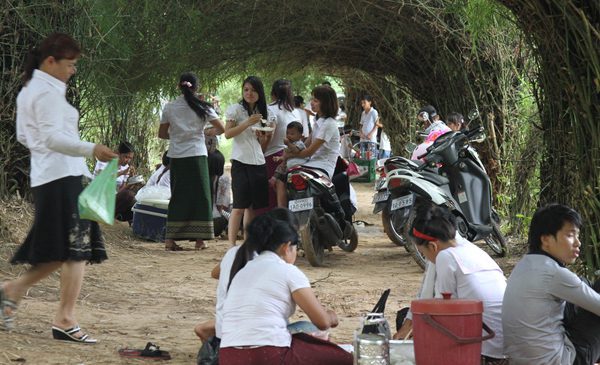This weekend is the conclusion of the Pchum Ben festival, a 15-day period of reflection, paying respect to your ancestors and giving offerings to monks.
The pagoda: a hive of activity
After buying some fruit, and my workmate Sovann’s family preparing an amazing array of food, we headed off to a pagoda south of Phnom Penh early in the morning. As we drove along, Sovann explained the intricacies of Pchum Ben to me – it’s primarily about paying respect to your ancestors and connecting with their spirits. Traditionally, everyone would visit seven different pagodas over the 15-day period of Pchum Ben, although these days a few less visits is the norm. At each visit food is given to the monks, as a means of connecting with and providing food to one’s ancestors. Normally, everyone will go to pagodas that contain the ashes of their ancestors.
When we arrived at the pagoda it was a bustling scene, as everyone provides offerings before the monks eat at 11. After taking off our shoes, the first stop was to offer food to a monk and share a prayer. I was happy my apples and oranges were well received, but I think Sovann’s family’s offering especially caught the monk’s eye. Sovann guided me through, from the correct way of sitting to explaining the murals throughout the pagoda. All around us, families were going through the rituals of offering food, praying, sharing rice and enjoying the vibrant atmosphere. Many of Sovann’s relatives joined us later on, as we shared a big picnic lunch under a beautiful bamboo canopy.
The festival is an equal blend of respecting death and life. With the history of killings by the Khmer Rouge, some people say that Pchum Ben has a particularly strong significance as a time of reflection on a challenging past. The impact this past had on my friend’s ancestors certainly sends shiver down my spine. For my own reflection, it was good to think more about my family connections – past and present. The great picnic with Sovann’s family amplified my thinking about my own family – they would’ve loved it.



